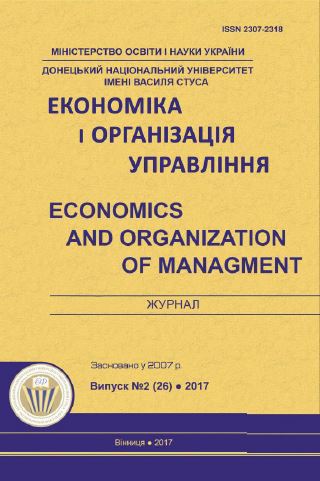Formation of international economic relations in the context of the global competition of countries in the landscape system.
Keywords:
international economic relations, global competition, international competitiveness of countries, world division of labor, economic development, neoindustrialization, postindustrial societyAbstract
The conditions of formation of international economic relations in the context of global competition of countries in the world economic system are determined. Global competition is the driving force behind the integration of national economic systems into the global labor division on the standardization and cooperation of industrial relations. A set of trends of development have been identified for these systems, such as: unification, standardization of components (raw materials, semi-finished products, spare parts); polarization of demand for road and cheap products; erasing industry and inter-industry boundaries to produce high-tech products; creation expert systems for making managerial decisions by means of information and communication technologies. The character of global competition, which takes the form of cooperation and cooperation both among producers, and between producers and consumers, is explored. In the world economy, the share of industrial and postindustrial countries is increasing; the sale of raw materials and high-tech goods is replaced by the supply of integrated services packages. In this way, industrial and post-industrial countries squeeze out weak countries from the world market, gain control over the chains of creating additional value for their own products. In the context of global competition, the formation of international economic relations takes place through the introduction of scientific and technological revolution in production, taking into account promising technological processes: the reduction of traditional productions (third and fourth) in favor of the newest (fifth and sixth). In the global perspective, countries with a transitory economy and developing countries are losing their own economic sovereignty due to the lack of available resources and the low current level of international competitiveness of their products on world commodity markets.References
Таранич О. В. Особливості визначення міжнародної конкурентоспроможності країн у контексті глобалізації світової економіки // Теоретичні і прикладні проблеми моделювання сталого розвитку економічних систем. Монографія / під загальною редакцією Т.В. Орехової; відповід. ред. О.Л. Некрасова. – Донецьк: «Сучасний друк», 2013. — С. 164-175.
Таранич О.В. Принципи й особливості стратегії формування міжнародної конкурентоспроможності країн у контексті глобалізації світової економіки / О.В. Таранич // Материалы международной научно-практической конференции «Проблемы экономического и социального развития в условиях мирового кризиса». – Донецк: ДонНТУ, 2009. — 244 с. — С. 209-211.
Gross domestic product: GDP by type of expenditure, VA by kind of economic activity, total and shares, annual, 1970-2015 [Електронний ресурс] / Data Center of UNCTADSTAT // United Nations Conference on Trade and Development. — Режим доступу: http://unctadstat.unctad.org/wds/ReportFolders/reportFolders.aspx (дата звернення: 17.05.2017). – Назва з екрана.
Родионова И.А. Мировая промышленность: структурные сдвиги и тенденции развития (вторая половина ХХ – начало ХХІ вв.) : монография. – М.: ГОУ ВПО МГУЛ, 2009. – 231 с.
Глобальна конкуренція: нові явища, тенденції та чинники розвитку: монографія / С.Ю. Пахомов; Держ. вищ. навч. закл. "Київ. нац. екон. ун-т ім. В.Гетьмана". — К., 2008. — 224 c.

